Book contents
- Frontmatter
- Contents
- List of Contributors
- Introduction
- Varieties of Supervenience
- Supervenience: Model Theory of Metaphysics?
- “Global” Supervenient Determination: Too Permissive?
- Weak Supervenience Supervenes
- The Tweedledum and Tweedledee of Supervenience
- Reduction in the Mind of God
- Psychophysical Supervenience, Dependency, and Reduction
- Supervenience Redux
- Nonreducible Supervenient Causation
- Physicalism, Supervenience, and Dependence
- An Argument for Strong Supervenience
- Arguments for Supervenience and Physical Realization
- Supervenience and the Essences of Events
- How Does Ontology Supervene on What There Is?
- Supervenience and Intentionality
- Supervenience, Coherence, and Trustworthiness
- Does Truth Supervene on Evidence?
- Index
Weak Supervenience Supervenes
Published online by Cambridge University Press: 29 March 2010
- Frontmatter
- Contents
- List of Contributors
- Introduction
- Varieties of Supervenience
- Supervenience: Model Theory of Metaphysics?
- “Global” Supervenient Determination: Too Permissive?
- Weak Supervenience Supervenes
- The Tweedledum and Tweedledee of Supervenience
- Reduction in the Mind of God
- Psychophysical Supervenience, Dependency, and Reduction
- Supervenience Redux
- Nonreducible Supervenient Causation
- Physicalism, Supervenience, and Dependence
- An Argument for Strong Supervenience
- Arguments for Supervenience and Physical Realization
- Supervenience and the Essences of Events
- How Does Ontology Supervene on What There Is?
- Supervenience and Intentionality
- Supervenience, Coherence, and Trustworthiness
- Does Truth Supervene on Evidence?
- Index
Summary
Introduction
Confusion Supervenes
Supervenience is a basically useful notion, but ‘supervene’ has become philosophers' jargon, waved like a wand to dazzle. ‘Supervene’ and ‘supervenience’, having been coined in their current philosophical sense around 1950, are now standard philosophical vocabulary. ‘Supervene’ in this use is purely a term of art, standing for several different concepts, as documented by Teller [p], Kim [cs], and me [s]. Yet the current mode is to take for granted that we all mean the same thing by ‘supervenience’. It is treated as though it were an everyday word with an ordinary, well-understood meaning we all intuitively grasp. The various technical senses would then be so many proposed explications of the assumed ordinary sense. But this common practice gets it upside-down. There is no ordinary philosophical sense of ‘supervenience’. There are only technical senses; their logical connections are complex. Here I will try once again to disentangle some of them.
A Relation between Families of Properties
A central confusion, or at any rate diversity, in the way ‘supervenience’ has come to be bandied about concerns the terms of the supervenience relation. As originally introduced, supervenience related two families of properties of the same type. For example, the mental properties of people might be held to supervene upon their physical properties. If the supervenient family is narrowed down to a single property, that's no problem.
- Type
- Chapter
- Information
- SupervenienceNew Essays, pp. 101 - 109Publisher: Cambridge University PressPrint publication year: 1995
- 2
- Cited by



